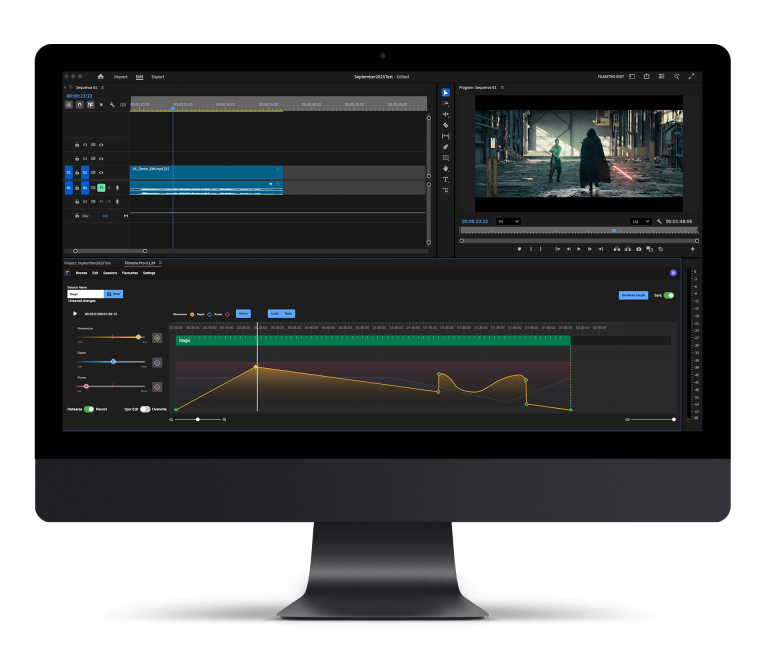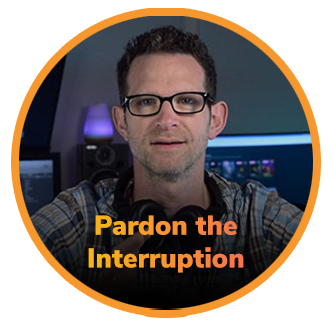Screenwriting Tools and Tips to Make Pre-Production a Breeze –
Have you ever wondered what it is that ensures the success of a film?
Well, according to Alfred Hitchcock, it’s one thing: the script.
The script acts as the foundation for your film: if the script is good enough, then the film will linger in the audience’s mind for years to come.
However, writing a good script is not as straightforward as it seems. In fact, in order to write a good script, it is kind of necessary for you to make sure of the best possible tools. Not only that, but you also have to keep a few things in mind while writing a script that will ensure that you’re on the right track.
In this article, we will take a look at these tools and tips, and discuss how you can implement them during the screenwriting process that will help you make pre-production a breeze as a whole!
Check Out Every Screenwriting Type You Should Know
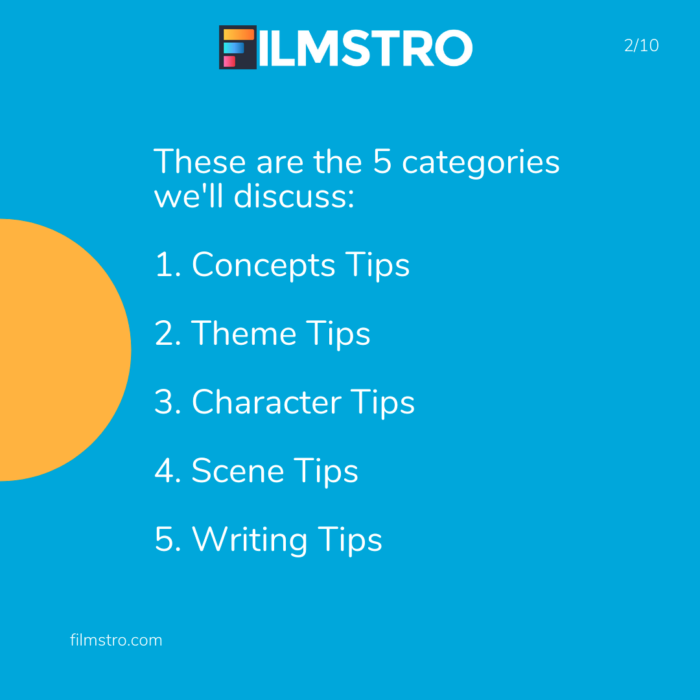
Screenwriting Tools
Ideally, your choice of screenwriting tools should depend on the kind of script you are looking to create. However, there are a few things that are essential no matter what, such as:
1) Screenwriting Software
This may seem like an obvious pick, but the amount of people who fail to choose the right software and bear the detriment during film production is overwhelming! This is mainly because the software helps you streamline the whole writing process by helping with things like hotkeys and formatting. These little things help a lot in the long run, and hence, it is absolutely necessary for you to pick the right script writing app for your project.
The good thing is that there are a lot of options you can choose from! Just a simple search in Google can introduce you to a plethora of apps that will make screenwriting as easy as cake! Of course, most of these are paid but there are many that are also free, so your budget should not be a problem.
2) Formatting Guide
The format of a script is what puts it all together! For this reason, before you dive headfirst into the writing process, it is important to be clear on how scripts are formatted. And it’s not only novice screenwriters that benefit from this – it is also experienced screenwriters.
If you have a formatting guide that you can refer to every time you start a new project, you can bring more consistency to your work. The format is the structure of the script and hence deserves utmost focus and dedication to ensure that you don’t face any problems during the writing process.
We would suggest that you make your own guide: do your research, understand what the preliminary rules are for screenplay and screenwriting, figure out which structure works the best for you, and create a detailed format guide out of that. Alternatively, you can search up for a template online and then customize it in accordance with your work.
3) Script Review Services
Once you are done creating your script, an important tool to keep around is script review services – because trust us, even the best of us can benefit from some review and editing!
Although most of the time these services can be hefty on the pocket, they are important because they can give you some deep insights on things like our characters, dialogue, plot: basically, everything that is crucial enough to make or break the success of your film.
Again, these might not be too hard to find. Just research a little and try to find a service that fits your needs. Some popular ones include the following:
Depending on how much you are willing to spend, you can get some really important feedback, suggestions, and advice on the elements of your screenplay.
So – these three tools are important for every screenwriter. You can always go for additional options as well, but make sure you know your screenplay inside and out before you do so that whatever you pick actually helps you improve your project.
Screenwriting Tips
And now, we dive into the more detailed section of this guide: the tips! Regardless of whether you are a beginner screenwriter or an expert, you can benefit from the following tips – so make sure you bookmark this page and visit it for future reference.
To make things clearer, we have split the following section into little segments. Check out these screenwriting tools and tips to make pre-production a breeze!
Concept Tips

It is essential for you to be clear on the concept of your film if you want the screenplay to be a success. For that, you can do the following.
1) Implement the three-way triangle of conflict.
The most compelling of scripts involve conflict – not just between the protagonist and the antagonist, but also involving the stake characters! Such a concept is more likely to capture your audience’s attention and enable them to take more interest in the concept.
2) Prompt your protagonist to take action.
Your protagonist can always drift into taking action towards the end of Act 1, but this is unlikely to stir things up in a way that is going to thrill your audience. Therefore, make sure that at the end of Act 1, our protagonist is kind of being forced to take action, instead of being eased into it.
Theme Tips

The theme of your script is another important element. Essentially, your theme is linked to the ultimate message you want the audience to receive. In this regard, these pointers may help.
1) Express it through your characters
You can use the characters to express and represent different elements of the theme. For example, the protagonist can represent the good side and the antagonist can be the bad side.
Sounds boring – but there are so many ways you can paint this out to be! Instead of the good, the protagonist can represent a free spirit, whereas the antagonist is someone who constantly tries to cage them. And then of course, the stakes character represents a whole different side of the argument – such as a middle ground. See where we are going with this? Basically, with this technique, you can really amplify the theme – no matter what it is!
2) Express it through the dialogue
The theme can also be represented through the dialogue. What each character says can be reflective of the theme: which means that if your protagonist is trying to highlight the importance of remaining free-spirited even when the world is trying to constrict you, their dialogues will reflect this idea, and this will, in turn, be used to amplify the overall theme.
3) Express it through objects
Lastly, you can also express the theme through objects – objects that are a part of the setting objects that your characters cling to, or objects they come across by chance. Again, there is a lot of space for you to play into this technique and hence it is easier for you to relay your theme in a more creative manner.
Character Tips
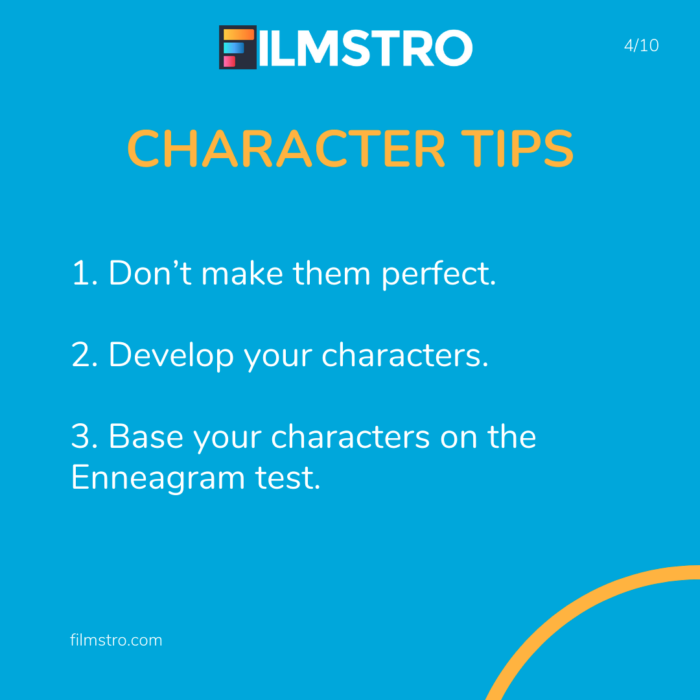
Needless to say, your characters are the medium between you and our audience. It is the character that the audience sees, relates to, likes, and dislikes. The following tips will help you write stronger characters.
1) Don’t make them perfect.
Honestly, perfect characters are boring, and boring characters are more likely to fail in terms of making the audience feel something. So, make your characters flawed. Not only that, but fill them with contradictions! These aspects add depth to your character and will make the audience relate to them better.
2) Develop your characters.
Even more boring than perfect characters are characters that don’t go through any sort of development. Make sure your characters go through ups and downs!
3) Base your characters on the Enneagram test.
What better way to shape your character than to base them on a personality-type test? You can use the Enneagram personality types to model your character. As adventurous as that sounds, it can really be helpful in terms of giving you a clear look at where you should be heading with your character. These types include reformer, helper, achiever, individualist, investigator, loyalist, enthusiast, challenger and peacemaker.
However, remember that these should only be the starting points for your characters, and the rest should be developed by you.
Scene Tips
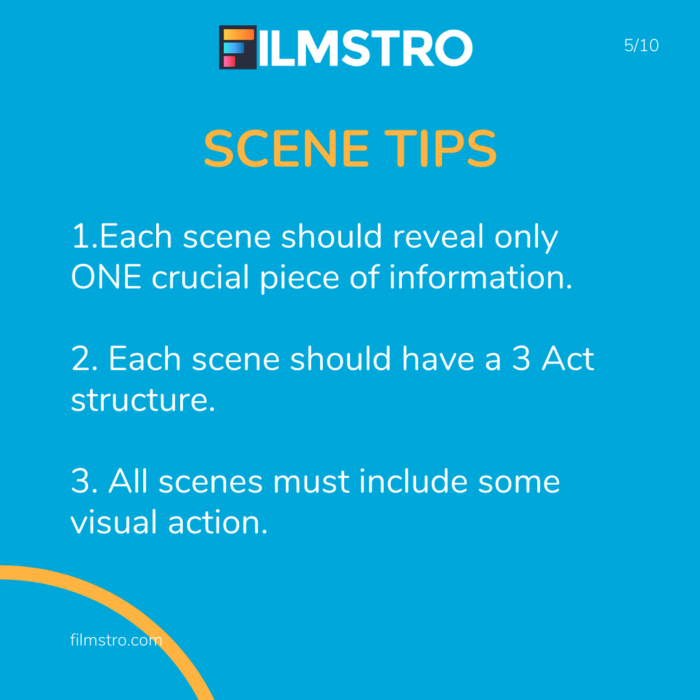
Each scene deserves an equal amount of focus. These tips should be able to help:
1) Each scene should reveal only ONE crucial piece of information.
Every scene is supposed to contribute towards building up the story. However, you don’t want to overwhelm your audience all at once. Therefore, it is important to limit yourself to the revelation of one small revelation at a time.
2) Each scene should have a 3 Act structure.
Yes, you heard that right! Not only should the overall film have a 3 Act structure, but writing a scene also means that you should give it a 3 Act structure. This will give it more clarity and make it more compelling to watch for the audience.
3) All scenes must include some visual action.
At the end of the day, no one wants to watch a scene that has nothing happening. Even if you know there is something happening in the plot during a particular scene, the audience will only understand this if there is some sort of visual action going on. In fact, the best scenes are those that create a balance between visual action and dialogue – so try to achieve that.
Writing Tips
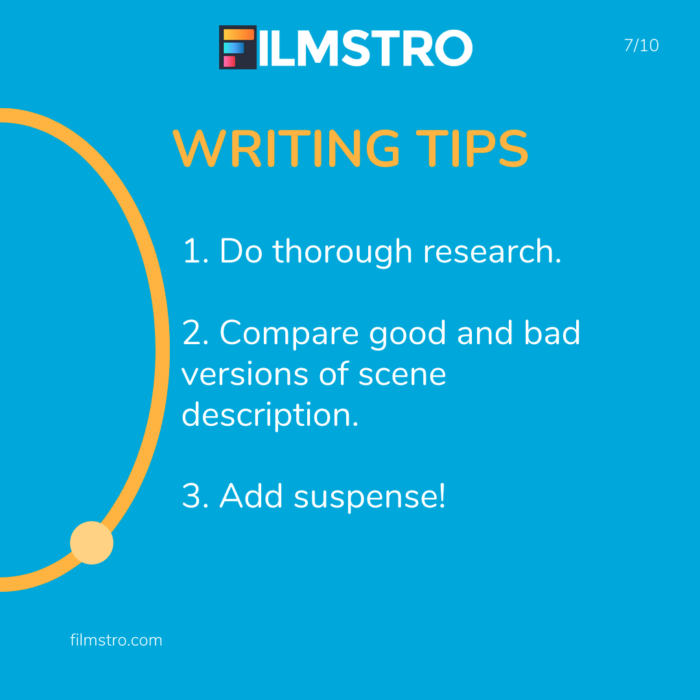
And then, of course, the actual process of writing the script. How can you make it better? Here’s how:
1) Do thorough research.
It is very important for you to thoroughly look into every source you can research all elements of your script before you actually get to the writing side.
2) Compare good and bad versions of scene description.
It is very important for you to have both the good and bad versions of scene descriptions side by side, so you can compare them and establish what makes a piece of writing good.
3) Add suspense!
Suspense is important. – no matter what genre you are writing for, leveraging suspense in your writing by artistically prolonging each scene is going to really get your audience to enjoy each moment.
Key Takeaway
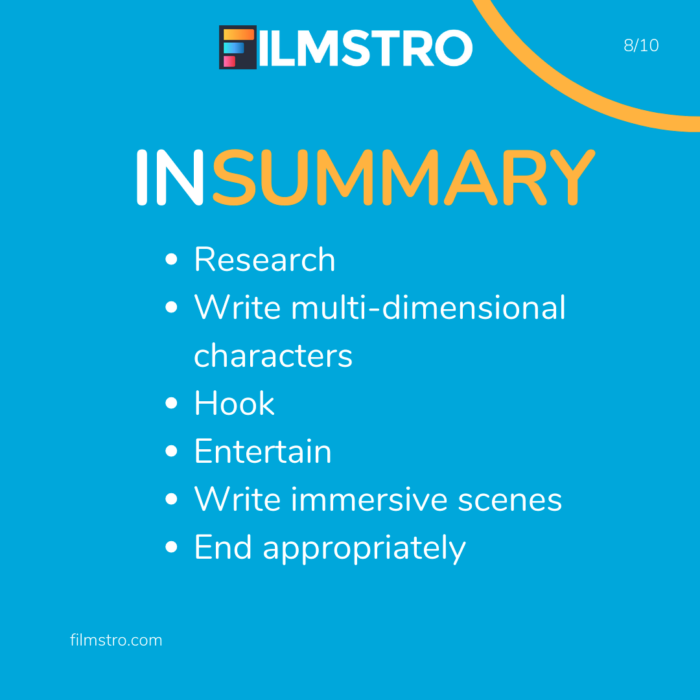
As you can tell, there is a lot that goes into making a script great. However, the one thing that will help you the best is dedication: if you are dedicated to your project, you will be able to swiftly make your way through the intricacies of screenwriting and move towards a successful, well-loved film!
We hope you enjoyed “Screenwriting Tools and Tips to Make Pre-Production a Breeze” and don’t miss out on any of our other blogs!
Sign up to Filmstro and follow us on Twitter, Facebook and subscribe to our Youtube channel. You can also check out our royalty-free music today by clicking here.





